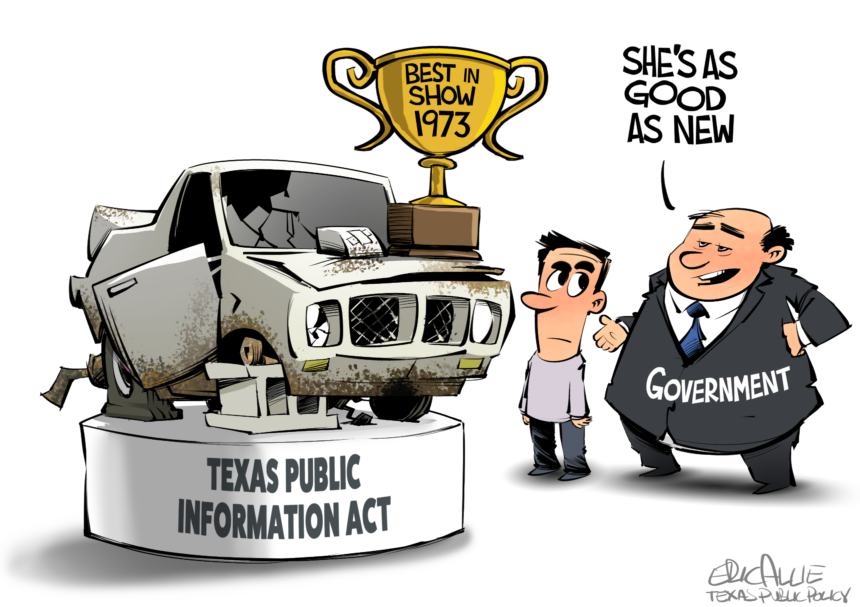Transparency at the Texas Capitol: A bipartisan effort

Editor's note: Kelley Shannon is executive director of the nonprofit Freedom of Information Foundation of Texas, based in Austin. For more information go to www.foift.org. The following is a guest column for kvia.com.
AUSTIN, Texas -- To witness bipartisanship at the Texas Capitol, look to the lawmakers who are working to improve open government laws.
Legislators from both political parties are igniting interest in transparency and creating the opportunity for all lawmakers to protect the people’s right to know. They’re carrying on our state’s legacy of openness.
When the reform-minded 1973 Legislature enacted the Texas Public Information Act, known then as the Open Records Act, it established one of the nation’s strongest transparency laws. This year marks its 50th anniversary. Court rulings and other actions have weakened the law, but as we celebrate open government during Sunshine Month throughout March let’s rally around the bills Texas legislators have filed this session to fortify the landmark act:
Contracting transparency: Access to government contracts allows taxpayers to see how their money is spent. A bipartisan proposal would enhance a law passed in 2019, ensuring the release of “super public” information, including the overall contract price and description of items and services. Senate Bill 680 by Sen. Nathan Johnson, D-Dallas, and House Bill 2492 by Rep. Giovanni Capriglione, R-Southlake, are the bills addressing contracting transparency.
Public records business days: A definition of “business day” in the Public Information Act is needed to provide consistency for everyone seeking public records. Currently, governments declare on their own which days they are open or closed for handling TPIA requests. Sometimes they don’t respond to requests. Proposals to correct this are contained in Senate Bill 618 by Johnson; House Bill 2135 by Rep. Terry Canales, D-Edinburg; and Senate Bills 43 and 44 by Sen. Judith Zaffirini, D-Laredo.
Dates of birth: Birthdates in criminal justice documents, such as police reports and incarceration records, and in candidates’ applications for public office allow the public to accurately identify a person. Correctly identifying someone charged with a crime protects the reputation of those who have the same name but aren’t facing charges. A date of birth also helps with thorough vetting of political candidates. Senate Bill 46 by Zaffirini and House Bill 2309 by Rep. Todd Hunter, R-Corpus Christi, allow access to birthdates in these records.
Public records and attorneys’ fees: If a records requestor runs into roadblocks and must sue to obtain public documents, the ability to recover legal fees levels the playing field between that individual and the government, especially if a government hands over records at the last minute after months of costly litigation. This legislation is House Bill 2874 by Rep. John Smithee, R-Amarillo, and Senate Bill 2286 by Sen. Mayes Middleton, R-Galveston.
Searchable-sortable records: While some governments provide data in searchable-sortable spreadsheet form, often making it easier to analyze, others do not. Senate Bill 965 by Johnson, Senate Bill 45 by Zaffirini and House Bill 2493 by Capriglione would codify the ability to obtain searchable-sortable records if such a format is available.
These measures are supported by the Texas Sunshine Coalition, made up of more than 15 diverse organizations united around the principle that access to information is essential in advocating for public policy and participating in our democracy.
Additional proposed transparency measures deal with public meetings, police accountability and other timely subjects.
For example, when someone dies in police custody, the public needs to know what happened. Some law enforcement agencies use a loophole in the Public Information Act to withhold records. Rep. Joe Moody, D-El Paso, filed House Bill 30 to remedy the problem.
Addressing public notices, Senate Bill 943 by Sen. Lois Kolkhorst, R-Brenham, and House Bill 2178 by Hunter would require government notices that by law must be published in a newspaper to also be posted at no extra cost on the newspaper's website and on a Texas Press Association statewide public notice website. This posting through a neutral third party provides an easy, reliable source for viewing public notices.
Transparency advocates will be speaking out until the legislative session ends May 29 to urge passage of these proposals that shine light on government enable us to hold it accountable.
Simply put, open government is good government.
